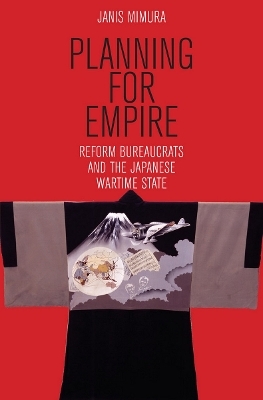
Planning for Empire
Reform Bureaucrats and the Japanese Wartime State
Seiten
2017
Cornell University Press (Verlag)
978-1-5017-1354-5 (ISBN)
Cornell University Press (Verlag)
978-1-5017-1354-5 (ISBN)
The origins and evolution of technocratic fascism in wartime Japan.
Japan's invasion of Manchuria in September of 1931 initiated a new phase of brutal occupation and warfare in Asia and the Pacific. It forwarded the project of remaking the Japanese state along technocratic and fascistic lines and creating a self-sufficient Asian bloc centered on Japan and its puppet state of Manchukuo. In Planning for Empire, Janis Mimura traces the origins and evolution of this new order and the ideas and policies of its chief architects, the reform bureaucrats. The reform bureaucrats pursued a radical, authoritarian vision of modern Japan in which public and private spheres were fused, ownership and control of capital were separated, and society was ruled by technocrats.
Mimura shifts our attention away from reactionary young officers to state planners—reform bureaucrats, total war officers, new zaibatsu leaders, economists, political scientists, engineers, and labor party leaders. She shows how empire building and war mobilization raised the stature and influence of these middle-class professionals by calling forth new government planning agencies, research bureaus, and think tanks to draft Five Year industrial plans, rationalize industry, mobilize the masses, streamline the bureaucracy, and manage big business. Deftly examining the political battles and compromises of Japanese technocrats in their bid for political power and Asian hegemony, Planning for Empire offers a new perspective on Japanese fascism by revealing its modern roots in the close interaction of technology and right-wing ideology.
Japan's invasion of Manchuria in September of 1931 initiated a new phase of brutal occupation and warfare in Asia and the Pacific. It forwarded the project of remaking the Japanese state along technocratic and fascistic lines and creating a self-sufficient Asian bloc centered on Japan and its puppet state of Manchukuo. In Planning for Empire, Janis Mimura traces the origins and evolution of this new order and the ideas and policies of its chief architects, the reform bureaucrats. The reform bureaucrats pursued a radical, authoritarian vision of modern Japan in which public and private spheres were fused, ownership and control of capital were separated, and society was ruled by technocrats.
Mimura shifts our attention away from reactionary young officers to state planners—reform bureaucrats, total war officers, new zaibatsu leaders, economists, political scientists, engineers, and labor party leaders. She shows how empire building and war mobilization raised the stature and influence of these middle-class professionals by calling forth new government planning agencies, research bureaus, and think tanks to draft Five Year industrial plans, rationalize industry, mobilize the masses, streamline the bureaucracy, and manage big business. Deftly examining the political battles and compromises of Japanese technocrats in their bid for political power and Asian hegemony, Planning for Empire offers a new perspective on Japanese fascism by revealing its modern roots in the close interaction of technology and right-wing ideology.
Janis Mimura is Associate Professor of History at the State University of New York at Stony Brook.
Introduction1. Japan's Wartime Technocrats
2. Military Fascism and Manchukuo, 1930–36
3. Bureaucratic Visions of Manchukuo, 1933–39
4. Ideologues of Fascism: Okumura Kiwao and Mori Hideoto
5. The New Order and the Politics of Reform, 1940–41
6. Japan's Opportunity: Technocratic Strategies for War and Empire, 1941–45Epilogue: From Wartime Techno-Fascism to Postwar ManagerialismBibliography
Index
| Erscheinungsdatum | 05.01.2017 |
|---|---|
| Reihe/Serie | Studies of the Weatherhead East Asian Institute, Columbia University |
| Verlagsort | Ithaca |
| Sprache | englisch |
| Maße | 155 x 235 mm |
| Gewicht | 454 g |
| Themenwelt | Geschichte ► Allgemeine Geschichte ► Neuzeit (bis 1918) |
| Geschichte ► Allgemeine Geschichte ► 1918 bis 1945 | |
| Geschichte ► Teilgebiete der Geschichte ► Militärgeschichte | |
| Sozialwissenschaften ► Politik / Verwaltung | |
| ISBN-10 | 1-5017-1354-X / 150171354X |
| ISBN-13 | 978-1-5017-1354-5 / 9781501713545 |
| Zustand | Neuware |
| Haben Sie eine Frage zum Produkt? |
Mehr entdecken
aus dem Bereich
aus dem Bereich
Europa 1848/49 und der Kampf für eine neue Welt
Buch | Hardcover (2023)
DVA (Verlag)
CHF 67,20
Giordano Bruno - ein ketzerisches Leben
Buch | Hardcover (2024)
C.H.Beck (Verlag)
CHF 41,85


